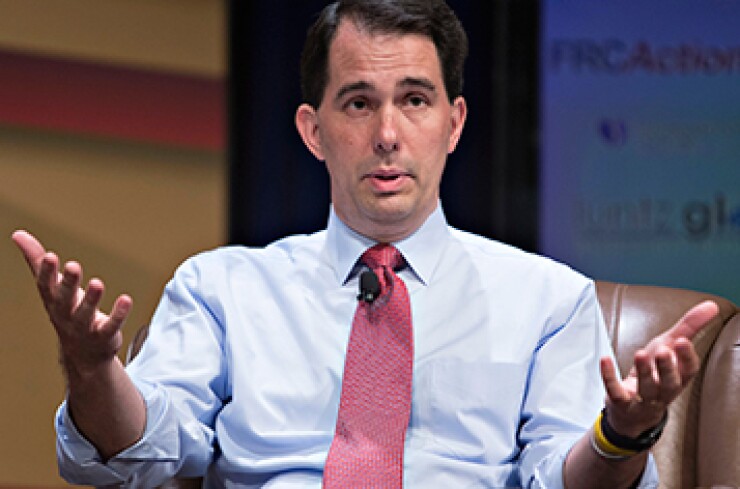
CHICAGO – Wisconsin Gov. Scott Walker's administration is defending its decision for a second consecutive year to defer repayment of commercial paper instead of retiring it as originally planned in the budget.
Capital finance director David Erdman called the decision to leave $101 million of CP in place a "prudent fiscal management tool" because of the low interest rates offered by the short-term program, but the Republican governor's critics attacked the maneuver as a means to inflate the state's fiscal position.
The state's fiscal 2016-2017 budget provided funds to retire $131.7 million in commercial paper principal on May 1. Instead $101 million of the debt was rolled over and will retired in the coming years at an added interest cost of $2.3 million.
The Legislative Fiscal Bureau provided an overview of the move to lawmakers in a
No legislative action is needed to tinker with the CP repayment schedule.
"In order to reduce current year GPR [general purpose revenue] expenditures administrations have chosen not to repay the principal portion of commercial paper debt that had previously been scheduled to be repaid and that was budgeted for by the Legislature," the memorandum says.
The capital finance office typically follows a principal repayment schedule for outstanding CP similar to its GO schedule, generally aiming to retire 10% to 20% annually. The state left in place $108 million of CP that was scheduled to be retired last year, sparking a similar attack from Democrats who accused Walker of using the maneuver to help erase a then-looming budget deficit.
Erdman said the state's CP trades at about 40 to 50 basis points, a rate much lower than its long-term debt. By holding onto the revenue that the state would have used to retire the scheduled amount this year it trims its more immediate long-term borrowing needs for capital projects.
"There may be a better use for that money other than paying off the commercial paper that has such a low interest rate," Erdman said.
The state dismisses any comparison to the past practice – used by Democrats and Republican administrations alike – of scoop-and-toss refunding. The CP is being rolled over, and no new debt is being issued to cover principal payments.
The move is providing fodder for Democratic lawmakers.
They have long argued that the state couldn't afford Walker's tax cuts which were enacted ahead of his failed bid for the Republican nod in the 2016 presidential race and accused him of fiscal management that has masked the state's true fiscal condition.
"It's embarrassing to hear Gov. Walker and Republicans make claims about Wisconsin's fiscal house being in order when they are continually reaching for the state credit card to cover for their short-sighted tax policy decisions," Rep. Gordon Hintz, D-Oshkosh, said in a statement issued by the Joint Finance Committee's Democratic members.
"Regressive tax cuts and a failure to grow the state's economy have already resulted in slashing funding for public school classrooms and the UW System to balance the budget," he added "Now, Republicans are pushing millions of dollars of debt payments and interest into the future to once again address the hole their tax cuts have created. The Wisconsin comeback credit card use continues."





